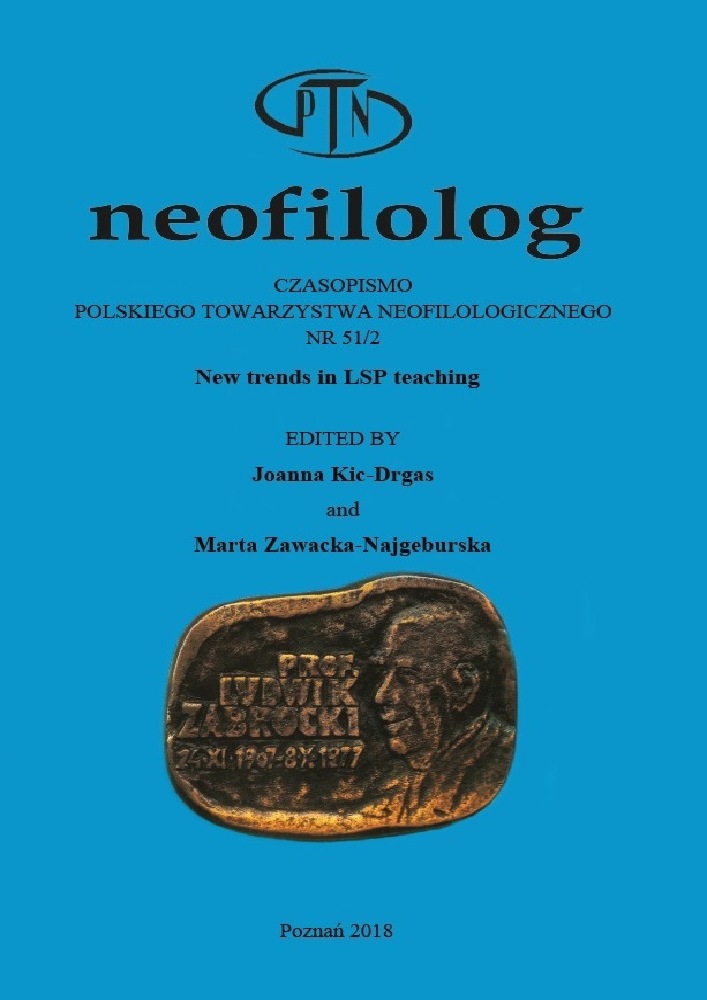Abstract
Designing English for Specific Purposes (ESP) courses is a challenging task. The teacher often has to cope with time constraints, shortage of resources as well as his or her insufficient knowledge of a given field of study. Students enrolled in a course are often consulted about the source of materials for instruction. The process of developing ESP tasks can be made easier and less time-consuming by means of employing student-generated communication activities which draw on learner-based approaches to teaching. The paper contains a collection of student-generated tasks that can be successfully used at the preparatory, follow-up or main stage of an ESP class. In the author’s teaching context on numerous occasions they have triggered lively exchanges between students: discussion, brainstorming, or negotiation. Student-generated activities naturally develop collaboration and autonomy, which are essential in the workplace environment. Just like communication skills, they have to be taught explicitly due to the fact that in the area of soft skills there exist considerable differences at the personal and culture-specific level. Finally, since students’ specialist knowledge is usually much better than that of the teacher, student-generated activities tend to be to the point, up-to date, or more precise with respect to the course objectives.
Literaturhinweise
Anthony L. (2007), The teacher as student in ESP course design (in) Wykład inauguracyjny na sympozjum pod tytułem 2007 International Symposium on ESP & Its Applications in Nursing and Medical English Education. Kaohsiung. Online: http://www.laurenceanthony.net/research/20071005_06_fooyin_keynote/20071005_06_fooyin_keynote_proc.pdf [access date: 02.08.2018].
Campbell C., Kryszewska H. (1992), Learner-based teaching. Oxford: Oxford University Press.
de Chazal E., Moore J. (2013), Oxford EAP. A course in English for academic purposes. Oxford: Oxford University Press.
Deller S. (1990), Lessons from the learner. London: Longman.
Dubin F., Olshtain E. (1986), Course design. Cambridge: Cambridge University Press.
Feez S. (1998), Text-based syllabus design. Sydney: National Centre for English Language Teaching and Research.
Flowerdew L. (2013), Needs analysis and curriculum development (in) Paltrige B., Starfield S. (eds), The handbook of English for specific purposes. Chichester: John Wiley & Sons, Inc, pp 325-346.
Gajewska-Skrzypczak I., Sawicka B. (2016), Język specjalistyczny na uczelni technicznej. Refleksje nauczycieli praktyków (in) “Języki Obce w Szkole”, No 3, pp. 5.
Lai E., Dicerbo K., Foltz P. (2017), Skills for today: what we know about teaching and assessing collaboration. London: Pearson. Online: http://www.p21.org/storage/documents/Skills_For_Today_Series-Pearson/Collaboration_White_Paper_FINAL.pdf [access date: 27.03.2018].
Lindstromberg S., Boers F. (2008), Teaching chunks of language. Rum, Austria: Helbling Languages.
Maley A. Using minimal resources: using questions. Part 1. Online: http://www.onestopenglish.com/methodology/minimal-resources/skills/minimal-res ources-using-questions-part-1/146548.article [access date: 18.09.2017].
Meddings L. (2011), 20 steps to teaching unplugged. [seminar] British Council. Online: https://www.teachingenglish.org.uk/article/20-steps-teaching-un plugged [access date: 15.09.2017].
Metusalem R., Belenky D.M., DiCerbo K. (2017), Skills for today: what we know about teaching and assessing communication. London: Pearson. Online: http://www.pearsonlearningnews.com/wp-content/uploads/2018/02/communication-skills-final.pdf [access date: 27.03.2018].
Tennant A. (2017), Minimal resources: teaching vocabulary. Online: http://www.onestopenglish.com/methodology/minimal-resources/vocabulary/m inimal-resources-teaching-vocabulary/146544.article [access date: 18.09.2017].
Thornbury S. (2017), M is for manifesto. [Blog] An a-z of ELT. Online: https://scottthornbury.wordpress.com/tag/teaching-unplugged [access date: 17.09.2017].
NETOGRAPHY
https://answergarden.ch [access date: 09.10.2017]
https://bubbl.us [access date: 18.03.2018]
https://conceptboard.com [access date: 18.03.2018]
https://flask.io [access date: 23.03.2018]
https://pl.padlet.com [access date: 09.09.2017]
https://surveyplanet.com [access date: 25.03.2018]
https://todaysmeet.com [access date: 09.10.2017]
https://www.tricider.com [access date: 09.10.2017]
Lizenz
Copyright (c) 2018 Neofilolog

Dieses Werk steht unter der Lizenz Creative Commons Namensnennung - Keine Bearbeitungen 4.0 International.
Autoren:
Die Autoren der zur Veröffentlichung in der Zeitschrift Neofilolog angenommenen Texte sind verpflichtet, den Vertrag über die Erteilung einer kostenlosen Lizenz für die Werke mit der Verpflichtung zur Erteilung einer Sublizenz CC auszufüllen, zu unterzeichnen und an die Adresse der Redaktion zurückzusenden.
Gemäß Vertrag erteilen die Autoren auf die in der Zeitschrift Neofilolog veröffentlichten Texte der Adam-Mickiewicz-Universität in Poznań eine nicht exklusive und kostenlose Lizenz und erlauben die Verwendung der Sublizenz Creative Commons Attribution-NoDerivatives 4.0 International (CC BY-ND 4.0).
Die Autoren behalten das Recht zur weiteren freien Verfügung über das Werk.
Benutzer:
Interessierte Onlinebenutzer dürfen die seit 2017 veröffentlichten Werke unter folgenden Bedingungen nutzen:
- Anerkennung der Urheberschaft - die Verpflichtung, zusammen mit dem verbreiteten Werk Informationen über die Urheberschaft, den Titel, die Quelle (Links zum Originalwerk, DOI) und die Lizenz selbst bereitzustellen;
- ohne Schaffung abgeleiteter Werke - das Werk muss in seiner ursprünglichen Form erhalten bleiben, ohne Zustimmung des Autors dürfen keine Studien, beispielsweise Übersetzungen, verbreitet werden.
Die Urheberrechte aller veröffentlichen Texte sind vorbehalten.
Sonstige:
Die Adam-Mickiewicz-Universität in Poznań behält das Recht auf die Zeitschrift als Gesamtheit (Layout, Grafik, Titel, Umschlagsprojekt, Logo usw.).

